Trending
Opinion: How will Project 2025 impact game developers?
The Heritage Foundation's manifesto for the possible next administration could do great harm to many, including large portions of the game development community.
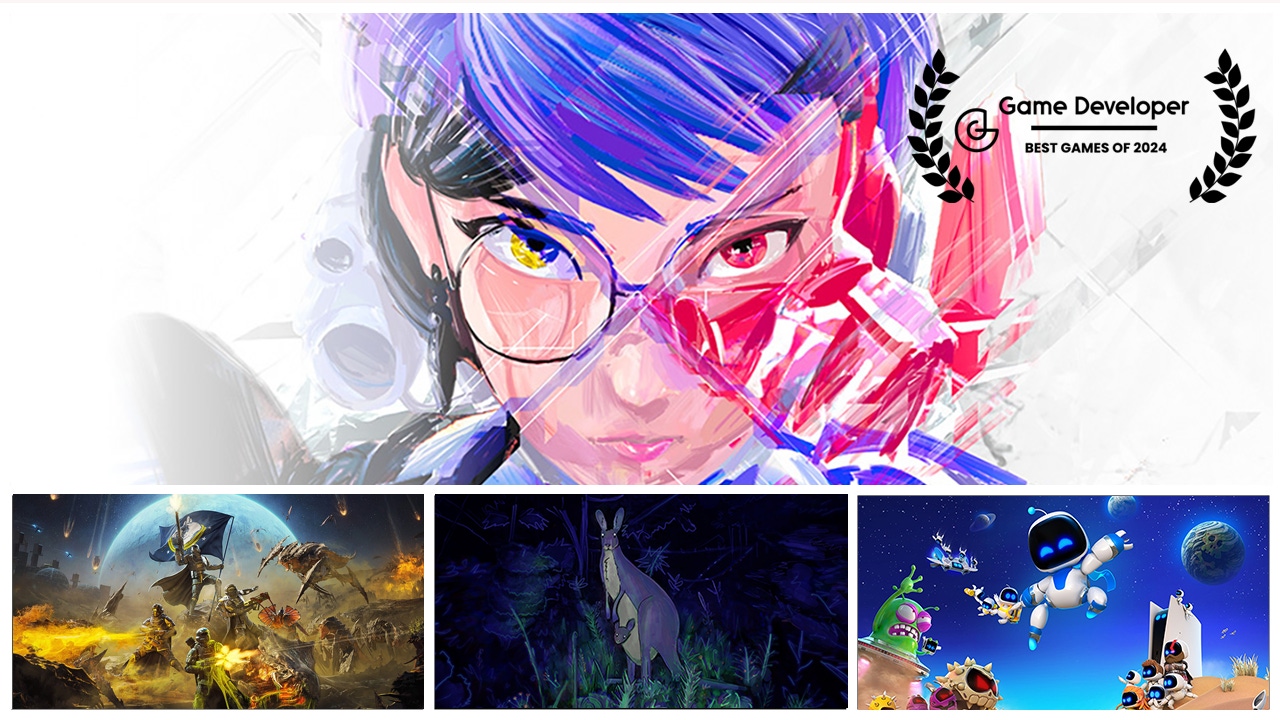
And that's a wrap on 2024. Was it a good year? Not for many in the video game community. Companies laid off workers by the hundreds, a gang of weirdos kicked off another right-wing harassment campaign against developers from marginalized backgrounds, and workers pressed on against the backdrop of horrendous and stress-inducing world events.
But press on they did. For many this was a year of celebration. Studios across the globe released a tidal wave of great games—so many that when it came time for the staff of Game Developer to pick our top 10, we each showed up to the table with wildly different sheets of nominees. Coming to consensus was difficult, but with the help of some ad-hoc ranked choice voting (maybe it's right for your elections too?), we selected 10 wonderful games all worthy of the title "Game of the Year."
It's our habit at Game Developer to present these games in no particular order—each its is its own unique, precious diamond, an exemplar of what video games are and can be as a medium. We hope you're as inspired by the games on our list as we were.
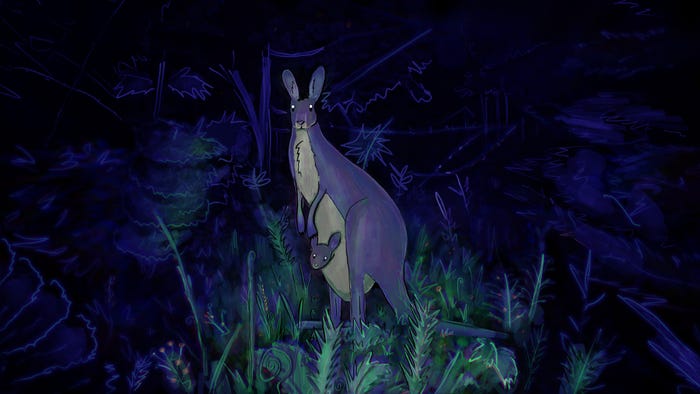
Image via Billy Basso/Bigmode
Well hot diggity dog we've got ourselves a freaky boy. Animal Well is an proper, unabashed oddity. Billy Basso's singular riff on the metroidvania is dripping with atmosphere that veers between adorable (just look at how your dinky blob climbs a ladder) to horrifying. Every pore of this experience effuses mystery, from the eerie creatures you encounter to how the interconnected labyrinth slowly unfolds to reveals layers upon layers of abstract truth. You might delve into the depths in search of answers, but can certainty be found in the luminescent caverns hidden below?
Each discovery only begs another question. How did that yoyo get here? Christ on a bike–why won't that cat leave me alone? Did that ostrich just turn into a snake? Is that an egg? Animal Well owes you nothing, but delivers everything fans of the genre could ask for and more. Puzzles intersect and intertwine, delivering glorious eureka moments before making your feel dumber than dirt.
It's an exhilarating cycle backed by celestial visuals that prove (as if you needed convincing) that pixel art can be absolutely jaw-dropping. It can be frustratingly obtuse at times, but there's something refreshing about a video game that puts all the onus on players. The knowledge you seek is right there. You know that. If only you could figure out how to obtain it.
Now go. The well calls you home. —Chris Kerr, news editor
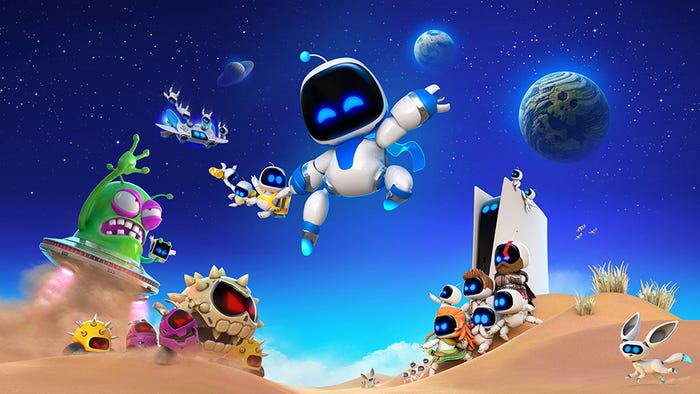
Image via Team Asobi/Sony Interactive Entertainment.
It's rare that I roll credits on triple-A titles these days, but Astro Bot had me hook, line, and sinker from minute one. Team Asobi's rambunctious platfomer is a near-perfect addition to the PlayStation 5 catalog and shows what can be achieved when major corporations let developers flex their creative muscles instead of trend-chasing.
Whether you're slowing time to transform tumbling poker chips into a makeshift staircase, turning into a kaiju-sized sponge to duke it out in a bathhouse brawl, or strapping on a barking-mad booster pack to blitz through barriers, Astro Bot weaves together a rich 3D platforming tapestry that prioritizes one thing above all else: joy.
That's the real secret of Astro Bot's success. Every design decision elicits wonder. The way you can feel Astro Bot's tiny trotters clink and clack across different surfaces thanks to the DualSense controller's haptic feedback. How rescued bots will cling to your gamepad, jostling in unison as you jiggle around in the real-world. Those 'holy shit' moments built around flooding the screen with as many physical objects as possible, teasing players with the prospect of pure unadulterated play. There's a tactile quality on display here that has become so rare in video games.
Astro Bot understands there is catharsis to be found in the silly and absurd. By leaning fully into that idea, Team Asobi delivered so much more than a nostalgia-fuelled marketing ploy. Although we do hope Sony ditches the corporate handwaving whenever Astro Bot embarks on another adventure. —Chris Kerr, news editor
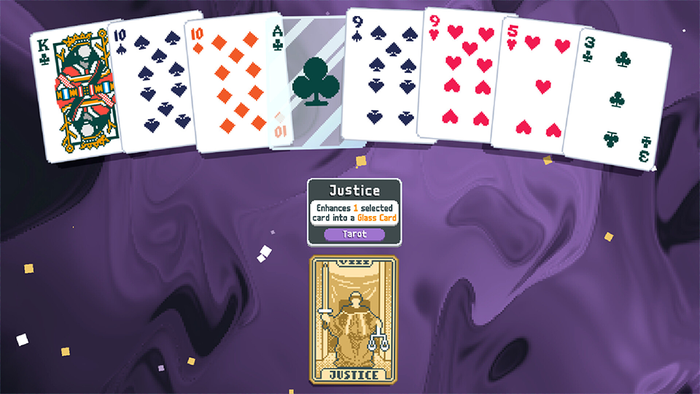
Image via Localthunk/Playstack.
This might sound odd, but indulge me for a second. Balatro is a Beethoven simulator masquerading as a poker-themed roguelike. Your aim here isn't to slam down poker hands in pursuit of fortune and favor, but rather to birth ethereal symphonies by rewriting the very fabric of play. When Balatro clicks (and it will) you'll feel like a master craftsman. A prophetic composer at the very top of their game.
It took me a few runs before the crashing cacophony of manic multipliers, spectral supporters, and jostling jokers became coherent, but when I finally found my flow the entire experience became nothing short of transcendental. Conventions and norms crumble to dust as you learn how to flip the script turn after turn. You'll need a pinch of luck along the way, but there's something immensely satisfying about assembling a deck that properly slaps, cutting through bosses like a hot knife through butter.
Failure and success is perfectly balanced. The former imparting valuable wisdom and unlocking new tools, while the latter leaves you feeling like the prodigal genius who learned how to manipulate the imperceptible. —Chris Kerr, news editor
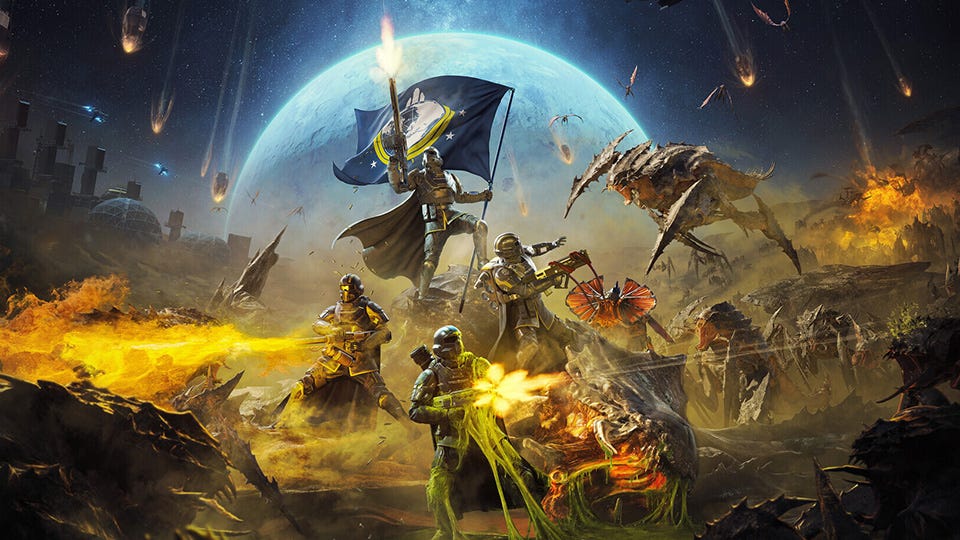
Image via Arrowhead Game Studios/Sony Interactive Entertainment.
Arrowhead Games’ Helldivers 2 wasn’t just a great game of 2024, it was a defining game of the year. It's the kind of multiplayer masterpiece only made possible when a core team of devs who’ve been working together since the making of Magicka could decide to take on such an ambitious project. Helldivers 2 doesn’t just ape the dark comedy of space marine fascism seen in Paul Verhoeven’s film Starship Troopers, it leans all the way in with chaotic, silly gameplay where friendly fire, falling corpses, or a bouncing barrel knocked your way by an explosion could all splatter your guts on the landscape.
Then there’s the Galactic War system. Multiplayer games have been experimenting with simultaneous in-game events for several years now, but Helldivers 2 cracked the code with the help a bit of tabletop roleplaying logic. This complex system allows a single "Game Master" (literally named "Joel") to direct which planets players should attack or defend. This can either rally players to act as though they’re fighting a common enemy—or drive a friendly wedge between them as they argue over which rewards to pursue.
This mix of gunplay, black comedy, and sense of being part of a greater whole drove millions of players into Arrowhead’s arms. The studio spent months responding to the glut of enthusiasm, reworking its org chart to improve the quality of updates and clamp down on crunch. This was aided by Sony’s gamble on bringing the game to Steam, but the huge PC playerbase forced the megacorp to bend the knee and remove the requirement for a PlayStation Network account. If the game wasn't such a siren call to a passionate playerbase, Sony wouldn’t have budged an inch.
That might be, as the game sarcastically suggests, is the power of Managed Democracy. —Bryant Francis, senior editor
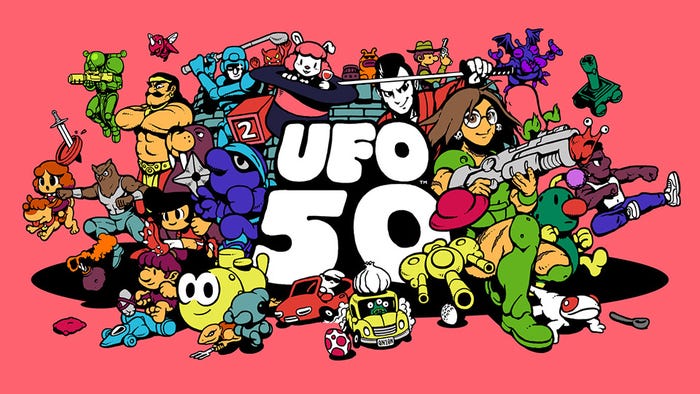
Image via Mossmouth.
UFO 50 is one of the coolest and most exciting projects (for me, anyway) in commercial game development in years. Developer Mossmouth had me at the pitch: 50 unique, new, retro-styled games (not mini-games), all bound together in a fictional universe and styled as a lost 80s' studio's full library. The games are varied: full RPGs, experimental arcade shooters, brawlers, puzzlers, adventures, all with modern twists and unique features, layered with positively delicious, retro-appropriate pixel art and music.
The sheer variety of mechanics, genres, and aesthetics would be enough to warrant this a space on the list—look at what these folks accomplished—but the quality and ingenuity here is unparalleled. There are multiple games within UFO 50 (I’m looking at you, Devilition, Rock On Island, Party House, Pingolf, Avianos, Mortol) that I would have gone to battle for in our GOTY deliberations on their merits alone, so the fact that they live here in one appealing package is all the sweeter.
UFO 50 has permeated my thoughts and imagination more than any other game this year, and it sits comfortably atop my own personal list. The collection has inspired me to think about cool mechanics, about invigorating genre blends, and about just how much life and energy still flow through the practice of pixel art. —Danielle Riendeau, editor-in-chief
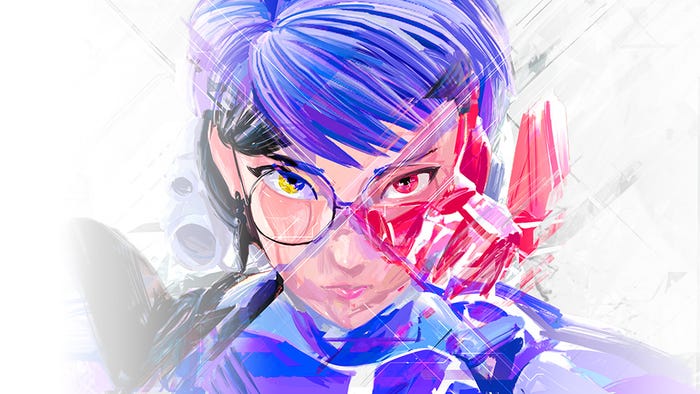
Image via sunset visitor 斜陽過客/Fellow Traveler.
Though labeled as speculative fiction, 1000xRESIST is an obscenely relevant and thought-provoking play in a “post-pandemic” 2024.
It’s the sort of game you have to play to understand, but at a glance, it’s an impossibly stylish sci-fi story about a small band of cloned survivors eking out a limited existence in an underground bunker following an alien invasion that brings a catastrophic plague to Earth. They are led by the ALLMOTHER, the plague’s sole survivor and an immune and immortal being from whom the clones were spawned, who leads them in their desire to return to the surface one day.
While the narrative, often delivered through esoteric dialogue that feels more like poetry than conversation, leaves a lot to unpack, I think what stuck with me most was its opposing themes of control and resistance, bitterness and grace, generational trauma and healing. Through Iris and her mother, through the ALLMOTHER, the sisters and the Occupants, we are asked to consider how the pursuit of comfort and safety contributes to the desire for control, how these intentions are corrupted by fear and power, and whether to endure the dysfunction and hardship of rebellion or submit in the name of stability.
Above all, it also asks us to consider the child we once were and how our experiences influence who we become. Will you hold on to the past and the memories that made you…or will you leave it all behind and become free? —Holly Green, community editor
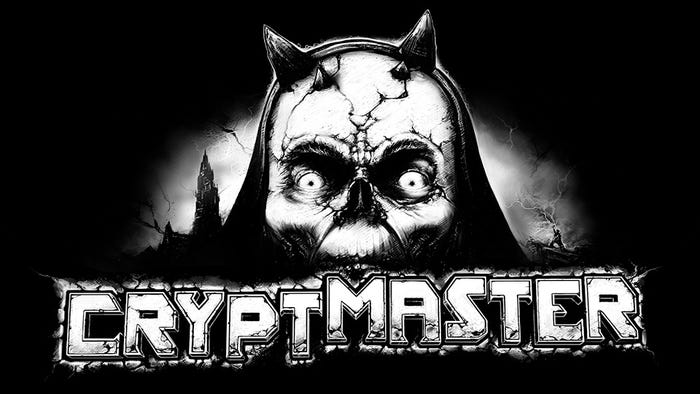
Image via Paul Hart, Lee Williams, Akupara Games.
Ah, Cryptmaster. Or as I like to call it, Wheel of Misfortune. In this game, the pen is definitely mightier than the sword. Or rather, it is the sword: players can only use the attacks and enchantments of their four protagonists by deducing them from the letters earned in successful combat. As the group makes their journey from the underworld to the surface, letters can also be earned by solving puzzles, each inspired by everything from Wordle to Hangman to childhood riddles. With each word added to their library, their arsenal of potential attacks grows, but also our understanding of their character.
What I love about this game is its correlation between combat and lore. By "earning" new letters, recovering “lost” abilities, you don’t just get an opportunity to learn a new attack: you learn how that word pertains to their history and who they were before their deaths. That part was just as entertaining as the mad scramble to type out attacks (a feature that brings fond memories of the type-based game The Textorcist).
Add to that the delicious sneering voiceover of the titular Cryptmaster, and the distinctive monochrome dreck of the game’s underworld dungeons and you got a game whose only flaw is its short playing time. —Holly Green, community editor

Image via Odd Meter/11-Bit Studios.
Indika is the game that broke our hearts (in a good way!). Odd Meter’s out-of-nowhere adventure game about the trials and tribulations of its namesake nun is an absurd, bleak look into the mind of a woman grappling with what is either a dissociative disorder or the literal devil whispering into her ear.
Her troubles don’t just come from within. She’s a young woman trapped in an alternate history 19th century Russia, pushed and pulled by forces outside her will. This is not a story of heroism you might find in a similar game like Asobo Studios’ A Plague Tale series. This is a tale of despair, greed, and selfishness, peppered with absurdist comedy and setpiece after setpiece where community editor Holly Green and I couldn’t help but cry "i can’t believe I just played that."
Its absurdity and bleakness are clear tributes to the history of Russian Literature, a genre whose pages are defined by spilt blood and protagonists wandering through otherworldly madness driven by the grinding gears of Russian society (be it Czarist, Soviet, or Putin-led in nature). But Indika doesn’t need you to have read Fyodor Dostoyevsky’s Crime and Punishment or Mikhail Bulgakov’s The Master and Margarita. It reaches into the language of games to sell its setpieces, as Indika’s flashbacks to her pre-convent life are told through retro-inspired interludes with pixelized art direction. That game-y pixel style persists in the modern day in the form coins that are supposed to represent the power of her devotion, each picked up with a satisfying "ding!" meant to signify advancement but ultimately mean…nothing.
This game is an ambitious triumph, a game you can only make if you believe players will want to explore the mind of a selfish, traumatized woman who becomes victim and perpetrator at the hands of religious extremism. —Bryant Francis, senior editor
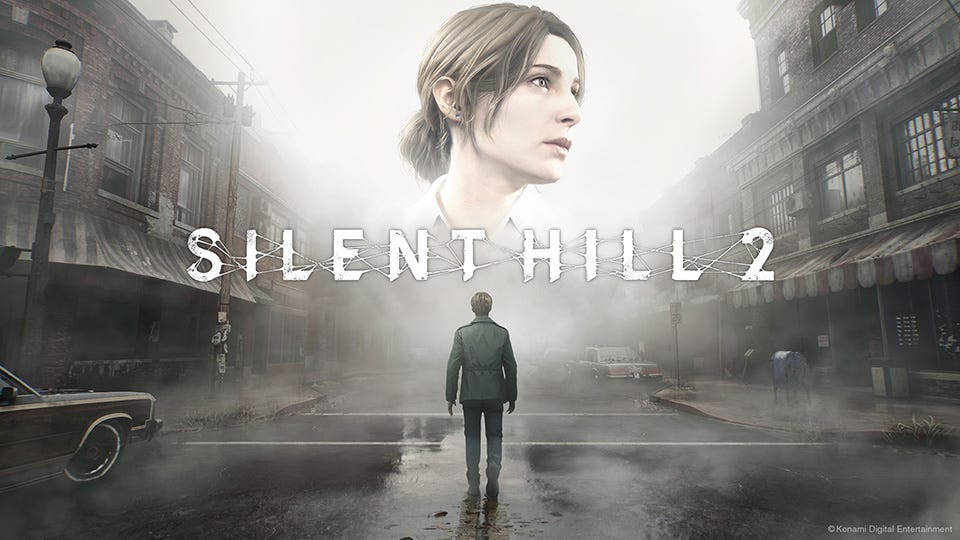
Image via Bloober Team/Konami.
The remake of Silent Hill 2 will go down as the story not just of one of the best game remakes of all time, but also one of the most surprisingly creative comebacks. Speaking as a horror game fan, I’m not sure I believed Bloober, a development team perhaps best known for this, could be capable caretakers of Silent Hill. And yet, from the graphics to character modeling, voice acting and additional narrative, this remake not only honors the original source material, it improves upon it. It managed to both attract new players and re-engage the longtime fans who’ve already played Silent Hill 2 dozens of times over.
Nowhere is this more masterful than in the game’s commentary on the cyclical nature of guilt and grief and its wall-breaking acknowledgment of its own status as a remake. Both James and the player have BEEN HERE FOR TWO DECADES, playing out the same loop, over and over, with faint memories, scraps of paper, and a mysterious set of Polaroids ultimately leading to the same conclusion: the cycle only ends when you choose to let go and walk away. —Holly Green, community editor
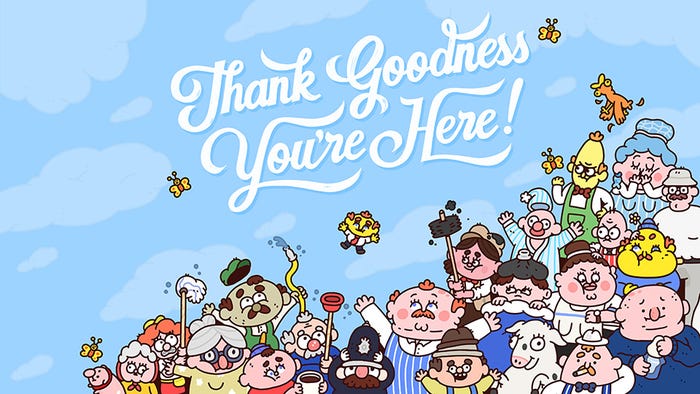
Image via Coal Supper/Panic.
Video games like this shouldn't exist. That's what the biggest players in the industry keep telling us. In a year when the major studios seemed intent on releasing and then unceremoniously butchering hyper-expensive failures, the indie scene proved it's still possible to innovate and surprise if you dare to stray from the well-trodden path. Just look at Thank Goodness You're Here.
Here we have an absurd sketch show disguised as a point-and-slap video game disguised as a heartfelt serenade to a very specific town in northern England. Publisher Panic and developer Coal Supper took a punt on crafting an experience that might well have bounced off the general populace and in turn created something magical.
The gags and japes are meticulously moronic (in the most brilliant of ways), lampooning the humdrum buffoonery that is commonplace in most English towns lurking above the midlands. There's emotional depth, too. Peer beyond the jokes and musical numbers (yes, herein lies a certified banger) and you'll unearth a sweet, nostalgic ode to the working class backbone of a country that so often gets overlooked. —Chris Kerr, news editor
Thank you for joining us in commemorating the top 10 games of 2024! This article is one of many 2024 reflections hitting Game Developer this month, with more to come! For even more thoughts and insights on the best of 2024, check out our Game Developer’s 2024 Wrap-Up keyword to catch up on all our End of Year content.
Read more about:
FeaturesGame Developer EssentialsTop StoriesGame Developer's 2024 Wrap-Up: Top Games, Devs, and TrendsYou May Also Like